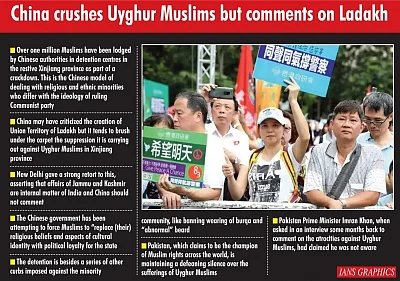New Delhi, Aug 8 (IANS) Over one million Muslims have been lodged by Chinese authorities in detention centres in the restive Xinjiang province as part of a crackdown. This is the Chinese model of dealing with religious and ethnic minorities who differ with the ideology of ruling Communist party.
China may have criticized the creation of Union Territory of Ladakh but it tends to brush under the carpet the suppression it is carrying out against Uyghur Muslims in Xinjiang province.
The Chinese government has been attempting to force Muslims to "replace (their) religious beliefs and aspects of cultural identity with political loyalty for the state", according to the Amnesty International. This is why it has lodged over one million Muslims in around 30 detention centres called "transformation-through-education" facilities, where Muslims are being forcibly indoctrinated to win over their loyalty for China.
The detention is besides a series of other curbs imposed against the minority community, like banning wearing of burqa and "abnormal" beard.
Even though not much unbiased news emerges from Xinjiang because of the tight control of Chinese authorities, the trickles of information have suggested that Muslims are not even allowed to observe Ramadan properly, with access to mosques being restricted and restaurants forced to stay open during the holy month of fasting.
According to media reports, China has amassed troops in this province to mount pressure on the local Muslims and keep them under strict surveillance.
While Uyghur Muslims, who are Turkish-speaking people with origin in Central Asian countries, face torment, the world, particularly the Islamic countries watch almost mutedly.
Pakistan, which claims to be the champion of Muslim rights across the world, is maintaining a defeaning silence over the sufferings of Uyghur Muslims.
In fact, Pakistan Prime Minister Imran Khan, when asked in an interview some months back to comment on the atrocities against Uyghur Muslims, had claimed he was not aware.
Clearly, he did not want to speak against Pakistan's "all weather friend" China, to which his country is virtually subservient, economically and strategically.
Turkey, which claims to have raised the issue with China, said in a statement about six months back that it was "no longer a secret that more than one million" Uyghur Muslims have been arbitrarily arrested and "subjected to torture and political brainwashing in internment camps and prisons."
China reacted sharply to these comments and Turkey retreated into a shell, a move apparently influenced by Istanbul's keenness to strengthen cooperation and revive historical links with the Communist country, particularly through the Belt and Road Initiative (BRI) of Beijing.
Since Xinjiang is located in western part of China, the BRI project will have to cross this region.
China, despite committing atrocities on Muslim minorities in Xinjiang, on Tuesday objected to creation of Ladakh as a Union Territory, saying the step was against its "territorial sovereignty" and asked India to "exercise caution" and not "complicate" the border issue.
"China has always objected to the Indian side drawing China's territory in the western section of the China-India border into India's administrative jurisdiction. This position is firm, consistent and has never changed in any way.
"In recent days, the Indian side has unilaterally modified its domestic laws in such a way as to continue to undermine China's territorial sovereignty. This practice is unacceptable," Foreign Ministry Spokesperson Hua Chunying said commenting on changes in Jammu and Kashmir.
New Delhi gave a strong retort to this, asserting that affairs of Jammu and Kashmir are internal matter of India and China should not comment.
"India does not comment on the internal affairs of other countries and similarly expects other countries to do likewise," External Affairs Ministry spokesperson Raveesh Kumar said.
--IANS
akk/
(At The Quint, we question everything. Play an active role in shaping our journalism by becoming a member today.)
